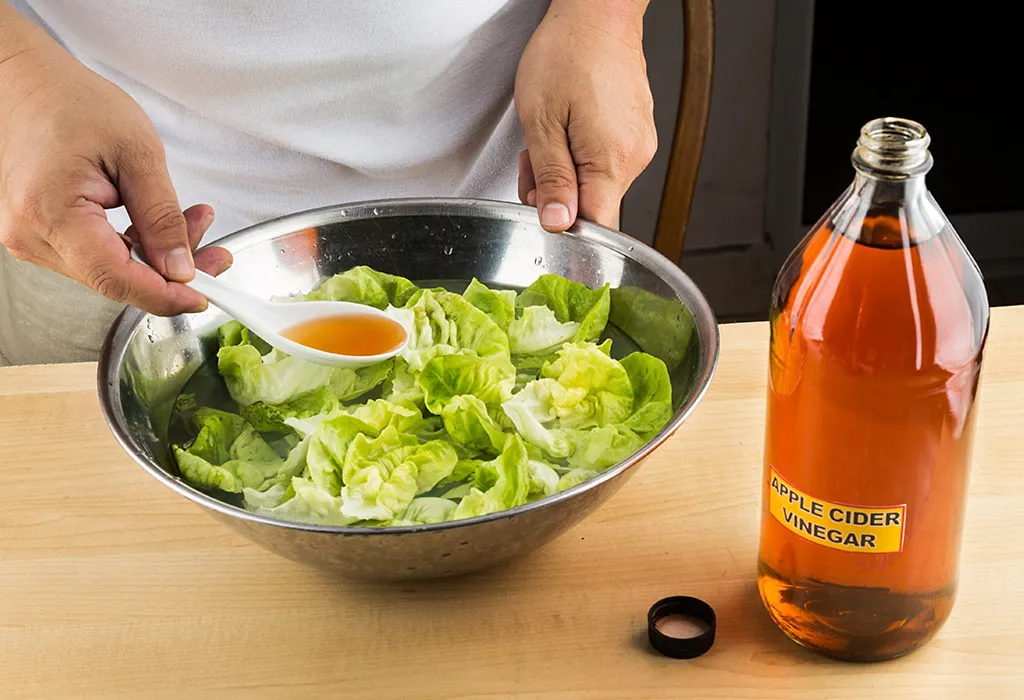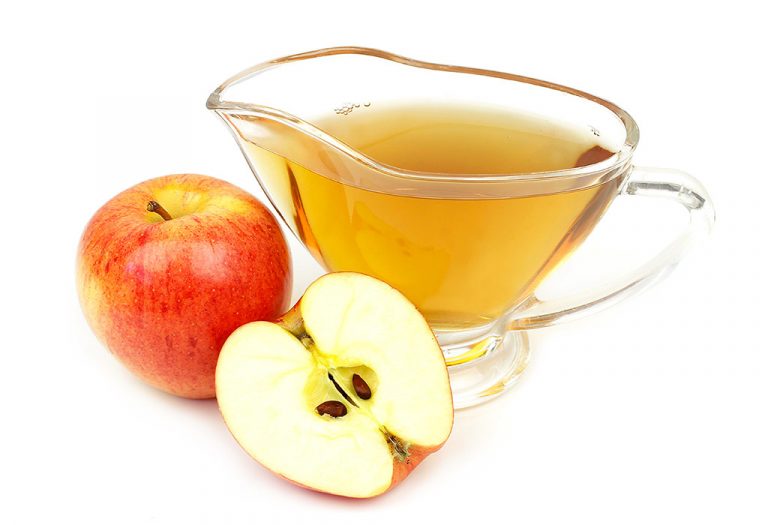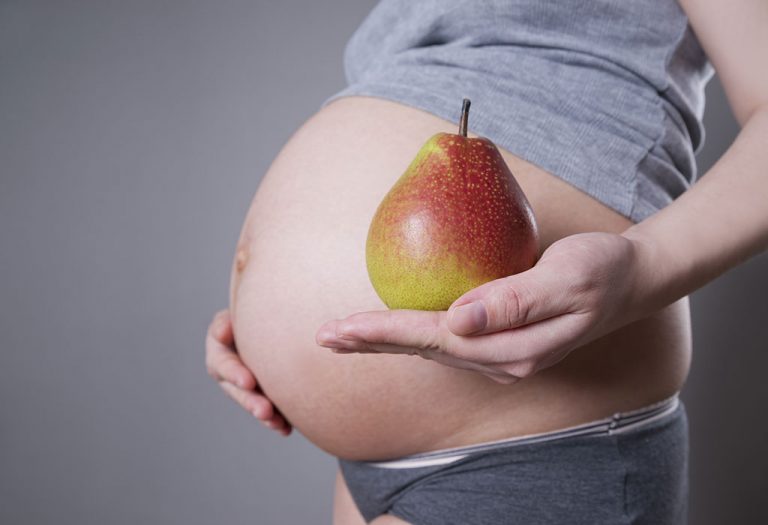Apple Cider Vinegar During Pregnancy – Is It Safe?
Pregnancy is a time when extra care and precaution must be exercised. A woman’s health goes through various changes like hormonal imbalance and weakening of the immune system. During this period, it is vital that she takes care of herself. If you are pregnant, too, you would have come across several tricks or remedies to get through the term. One such remedy is to consume apple cider vinegar. But can you consume apple cider vinegar while pregnant? What are its benefits, and how should one consume it? To make it easy for you to understand, below we have covered all the information about having apple cider vinegar when pregnant.
What Is Apple Cider Vinegar?
Apple cider vinegar (AVC) is one of the most common types of vinegar available. It is made from cider, a type of concentrated apple that has been left to ferment over a period of time. The cider first ferments to alcohol before finally transforming into acetic acid (1). It is safer to consume pasteurised vinegar, as it is free of harmful bacteria that can cause E. coli in pregnancy.
This versatile ingredient can be used in salads, sandwiches, etc. However, it is most beneficial to drink a teaspoon of apple cider vinegar every day in a glass full of warm/lukewarm water. Remember that unfiltered, unpasteurised apple cider vinegar is extremely potent and can burn your oesophagus if consumed raw.
Can a Pregnant Woman Drink Apple Cider Vinegar?
Although there hasn’t been any study to prove apple cider vinegar is harmful to consume during pregnancy, you must practise caution and check with your doctor before making it a part of your diet. Usually, drinking apple cider vinegar is safe, as long as it is pasteurised and diluted.
Consumption of raw apple cider vinegar during pregnancy is not recommended due to its potency, its potentially harmful bacterial content, and a weakened state of the immune system during pregnancy. Therefore, pregnant women must be cautious as a foetus has requirements different from those of a fully developed baby.
Another consideration is that the antibodies that support the immune system are overworked during pregnancy and could fail to combat the adverse effects of this kind of bacteria. It is, therefore, best to consult a doctor and seek appropriate medical guidance before consuming apple cider vinegar for pregnant women.
Once the doctor has given the go-ahead and decided upon a quantity of apple cider vinegar, you can include in your diet, you are bound to reap some of the benefits given below.
Benefits of Apple Cider Vinegar During Pregnancy

Many believe apple cider vinegar is good for pregnancy. But consuming apple cider vinegar is not always recommended during pregnancy. It is strictly advisable that pregnant women consult their doctor before adding any dose of apple cider vinegar to their diet to gain some health benefits, such as the ones given below. Please bear in mind that there are hardly any studies to prove the benefits of consuming apple cider vinegar during pregnancy. Therefore, we urge readers to seek guidance and input from their medical practitioners.
1. Preventing Urinary Tract Infections (UTI)
Apple cider vinegar is known to have enzymes and minerals to help with the prevention and treatment of UTIs (2). It is recommended to dilute apple cider vinegar (ACV); the ideal ratio would be 1 teaspoon of ACV in 1 glass of water. It is advised that you check with your medical practitioner for the quantity and frequency of having ACV during pregnancy. Having said that, you must also bear in mind that its effectiveness in preventing UTI stands unproven due to the lack of adequate studies.
2. Regulates Heartburn
Pregnant women are commonly afflicted by heartburn around the 12th week of pregnancy. Apple cider vinegar is often considered as one of the quickest-acting natural remedies for heartburn; however, its effectiveness for regular heartburn during pregnancy has not yet been established (3).
3. Combats Acne
Another common problem during pregnancy is an acne breakout, especially if you had acne before. ACV is believed to help keep the skin healthy and combat acne, neither of which is medically proven. Also, remember that the acids in AVC can cause burns and leave scars on the skin. Therefore, it is best to consult a dermatologist who can work along with your OB/GYN to prescribe appropriate treatment for severe acne (4).
4. Helps With Morning Sickness
Apple cider vinegar is pH-neutral that helps settle the stomach acids that cause nausea. It can provide relief from the terrible feeling of morning sickness during the first trimester of pregnancy. All you have to do is mix two tablespoons of it in a cup of warm water and drink it early in the morning.
5. Relieves Leg Cramps
Leg cramps can be caused due to low potassium levels and pressure on the circulatory system, resulting in troubled sleep (5). Apple cider vinegar contains excellent levels of potassium and can help with discomfort.
6. May Improve Digestion and Metabolism
According to a 2016 animal study, apple cider vinegar may change how digestive enzymes work, helping the body process fats and sugars more effectively. These changes could be particularly advantageous for individuals with type 2 diabetes (6).
Apple cider vinegar may have been known to combat a lot of conditions, but due to the absence of adequate research and studies, we strictly recommend that you consult your medical practitioner before including it in your pregnancy diet.
Nutritional Value of ACV
While not a significant source of macronutrients like fat, protein, or carbohydrates, apple cider vinegar’s nutritional value lies in its acetic acid content and trace amounts of minerals and vitamins from its apple origins. The following table details the nutrients found in one tablespoon (15 ml) of apple cider vinegar:
| Nutrients | Quantity |
| Calories | 0 – 3 kilocalories |
| Acetic Acid | Approximately 1 gram |
| Potassium | 11 – 15 mg |
| Manganese | Trace amounts (approx. 0.1 mg) |
| Amino acids | Trace amounts |
| Polyphenols | Trace amounts (e.g., gallic acid, catechin) |
| Probiotics (Mother) | Present (in unfiltered, unpasteurized varieties) |
What Quantity of Apple Cider Vinegar Is Good During Pregnancy?
If your medical practitioner has approved and prescribed apple cider vinegar, you must also check with him/her for the quantity. This is because the concentration and quantity of apple cider vinegar might differ than the regular quantity during pregnancy.
 Unpasteurised or Pasteurised Vinegar?
Unpasteurised or Pasteurised Vinegar?
A general rule of thumb would be to go with pasteurised consumables during pregnancy, as they eliminate potentially harmful bacteria. However, even before consuming pasteurised vinegar, you must consult your medical practitioner to know about any possible risks it may cause for you and your baby’s health.
Possible Risks of Apple Cider Vinegar
While apple cider vinegar is popular for its potential health benefits, it is crucial to acknowledge its risks due to its high acidity. Consuming it, especially undiluted or in large amounts, can lead to several adverse effects.
1. Damage to the Teeth, Throat, and Digestive Tract
The high acetic acid content is the primary cause for concern. Drinking undiluted apple cider vinegar can cause chemical burns to the delicate lining of the oesophagus and the digestive tract (7). Furthermore, direct contact with teeth can erode the protective enamel, leading to increased sensitivity, cavities, and permanent damage (8).
2. Adverse Interactions with Medications
Apple cider vinegar can interfere with the action of certain prescription drugs. It may enhance the effect of diabetes medications like insulin, potentially causing dangerously low blood sugar (hypoglycemia). It can also interact with diuretics (water pills), potentially leading to abnormally low potassium levels (hypokalemia). It is essential to consult a healthcare professional before using ACV if you are on any medication.
3. Gastrointestinal Side Effects
Even when diluted, apple cider vinegar can cause unpleasant gastrointestinal issues for some individuals. These can include stomach upset, nausea, and acid reflux, as the acidity can irritate the stomach lining.
4. Potential for Skin Burns and Irritation
When applied directly to the skin, the acidic nature of apple cider vinegar can cause chemical burns and irritation. It should always be diluted significantly before any topical application and used with extreme caution.
Apple cider vinegar may not have any disadvantages otherwise, but there are no studies that prove the level of risks it may pose for pregnant women and their babies growing inside them.
Healthy Alternatives to Apple Cider Vinegar During Pregnancy
Given the potential risks of apple cider vinegar’s acidity during pregnancy, many seek safer options to address common concerns like nausea or digestion. Fortunately, several gentle and effective alternatives are considered pregnancy-friendly.
- Ginger
- Lemon water
- Coconut water
- Peppermint tea
Tips and Precautions for Pregnant Women
Here are some tips to remember before you make a decision to consume apple cider vinegar during pregnancy.
- Take precautions when consuming apple cider vinegar capsules or supplements. Run them by your doctor first.
- Moderate the dosage of consumption of ACV based on an in-depth discussion with your physician.
- Don’t combine ACV with other vinegar when consuming. It can increase the acidic potency.
- Do not use ACV as a substitute for medication unless your physician says otherwise.
- Take precautions when trying to consume ACV mocktails.
- To maximise the benefits, buy organic ACV.
- Do not consume plain ACV as it can erode your tooth enamel and oesophagus. Dilute it in water or any other liquid (non-vinegar/non-acidic) and drink it.
- Immediately rinse your mouth with water after consuming apple cider vinegar to protect your enamel from harm.
- Do not consume apple cider vinegar if you are suffering from stomach problems (unless advised by your doctor).
- Avoid consuming ACV 30 minutes before or after drinking coffee or tea.
How to Drink Apple Cider Vinegar
- Dilute one teaspoon of ACV in a glass of filtered water or coconut water and add two spoons of honey. Mix and drink.
- Dilute one teaspoon of ACV in a glass of fruit juice (low-acid) and drink. Add a spoonful of honey, if required.
How to Buy the Best Quality Apple Cider Vinegar
Wondering how to buy the best quality apple cider vinegar, especially when you are expecting and do not wish to take any risk? Here are tips for you for buying apple cider vinegar.
- Make sure that the vinegar is made using crushed apples or cider – read the ingredients to know.
- Check for the pale amber colour of the apple cider vinegar before buying.
- Most of the apple cider vinegar available in the market is unpasteurised. Consult with your doctor first, as unpasteurised products may contain potentially harmful bacteria.
When to Consult Your Doctor
Consult your doctor if you notice any of these signs after consuming ACV:
- Red, hot, and itchy rashes on your face
- Acidity, indigestion or any stomach-related problem
- Nausea and vomiting
- Dizziness
FAQs
1. Can I take ACV supplements or pills during pregnancy?
You should avoid taking AVC supplements or pills when pregnant, as most of the supplements do not actually contain apple cider vinegar. Also, these supplements can be a little risky to consume if raw apple cider vinegar is the ingredient.
2. Can ACV help with stretch marks and anaemia in pregnancy?
Apple cider vinegar during pregnancy may be beneficial in treating haematological problems and anaemia and can effectively reduce the size of striae, reducing the appearance of stretch marks, but additional research is required to confirm its effectiveness.
3. Does apple cider vinegar cause miscarriage?
No harm or other complications have yet been reported or connected with the use of apple cider vinegar in pregnancy.
This was all about ACV and pregnancy. Apple Cider vinegar is beneficial for your body; however, its consumption during pregnancy might vary on a case-by-case basis. It may have multiple health benefits, but it could potentially cause other health issues during pregnancy. Therefore, expectant mothers must speak to their medical practitioners before making a decision.
Disclaimer: The information given in this article is not intended or implied to be a substitute for professional medical advice, diagnosis, or treatment. The content is for general information purposes only and should not be used as a substitute for medical advice.
Also Read:
Drinking Soft Drinks during Pregnancy
Can You Drink Wine While Pregnant?
Non Alcoholic Beer during Pregnancy
Effects of Drinking Soda in Pregnancy


































